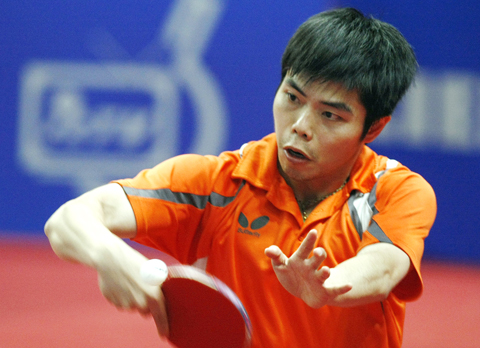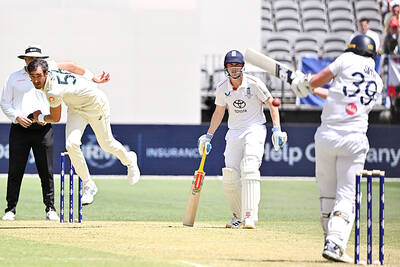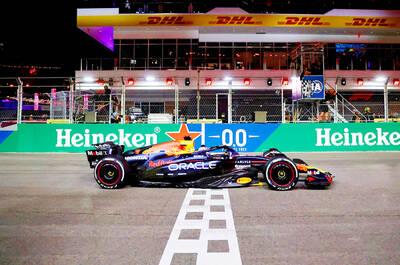Risks of birth defects, nervous system and lung problems brought about the end of the “speed glue” era in table tennis and next month’s world championships will be the first without it for over 30 years.
The International Table Tennis Federation (ITTF) banned the substances from Sept. 1 last year, or just after China’s clean sweep of gold medals on home soil in the Beijing Olympics.
That means the elite table tennis scene at the Yokohama world event from April 28 to May 5 will have changed markedly compared with previous championships. Speed glue, first discovered by Hungary’s Tibor Klampar more than 30 years ago, revolutionized the game, increasing spin and speed by up to 30 percent and making powerful shots easier to play.

PHOTO: AP
Yet there was a darker side. While the game became a better spectacle because of powerful shotmaking, harrowing incidents started the warning bells ringing. A player at the Scottish championships collapsed after his glue can fell over and he inhaled all the fumes.
Some athletes had nervous system-related disorders such as severe headaches, concentration problems and poor awareness.
German table tennis magazine Deutsche Tischtennissport even reported a pharmacist stating there had been at least five instances of birth defects in newborn babies after skin contact with toluene, one of the toxic solvents in the first generation of speed glues.
Former French national team doctor Christian Palierne, who carried out major research into the consequences of speed gluing, told Deutsche Tischtennissport: “It has been proved beyond doubt that inhaling solvents during the speed gluing process has side effects. The coaches must ask themselves whether they really can be answerable for allowing 11 to 13-year-olds to use speed glue.”
Still, these claims were the extreme end of the spectrum and on a day-to-day level, health-related problems were rare.
Yet in December 1992, the ITTF banned speed gluing.
Players organization CTTP, led by Sweden’s 1991 world champion Jorgen Persson, said the decision was too drastic and too close to the 1993 world championships in Gothenburg, Sweden.
The 1992 Olympic champion Jan-Ove Waldner was also concerned the ban would simply bring about cheating. Two months after the ruling, the ITTF rescinded the ban and instead found a compromise whereby dangerous glues, containing the most dangerous toxic substances such as toluene and trichlorethylene, were made unavailable through control of the market.
The glues were weaker, meaning players had to put on more and more coats of it to get the same speed and spin-boosting effect, often just prior to each international match.
ITTF president Adham Sharara said the repeal of the speed glue ban in 1993 was a mistake and that the decision to ban it in September last year would stay.
“There’s no going back,” he said. “We’ve made enough compromises and the end of the Olympic Games in China spells the end of speed gluing. It would be irresponsible to ignore all the reports about the danger of certain chemicals in our society and in our sport.”

Nineteen wickets fell yesterday on an opening day of carnage in the first Ashes Test, with England’s attack led by skipper Ben Stokes bowling them into a position of strength after Australia dismissed the tourists for 172. A rampaging Mitchell Starc took 7-58 to put England on the back foot after Stokes won the toss on a fine day at a packed Perth Stadium and chose to bat. Harry Brook (52) and Ollie Pope (46) offered the only resistance as they crumbled after lunch, but England’s elite fast bowlers, led by an exceptional Stokes with 5-23, fought back to reduce the hosts

Paul Pogba on Saturday described his emotional Monaco debut as a moment of relief and gratitude, after the French midfielder returned to the pitch for the first time in more than two years following a doping ban. The former Juventus and Manchester United player, who joined the French Ligue 1 side on a free transfer in June, had not played a competitive match since September 2023. Pogba received a four-year ban in February last year after testing positive for banned substance DHEA (dehydroepiandrosterone), which boosts testosterone levels. The suspension was cut to 18 months after an appeal at the Court

FINAL STRETCH: After the McLaren drivers’ disqualifications, Verstappen’s chances of a fifth successive title would depend on another big slip-up from Norris and his team Formula One world champion Max Verstappen on Saturday produced a masterful drive to win the Las Vegas Grand Prix and his title hopes were boosted further with the McLarens of championship leader Lando Norris and Oscar Piastri being disqualified. Norris finished the race in second with Piastri fourth, but the skid blocks on both cars were found after the race to be less than the minimum depth. The disqualifications mean that with two race weekends remaining, four-time defending champion Verstappen is level on points with Piastri in the title race, just 24 points behind Norris. However, Verstappen’s chances of a

Houston’s Calen Bullock on Thursday intercepted reigning NFL Most Valuable Player Josh Allen twice and the league’s top defensive unit powered the Texans over Buffalo 23-19. Allen was sacked eight times, his most in any game, for 70 lost yards and Bullock’s final pickoff killed the Bills’ last desperate drive with 18 seconds remaining. The Texans, who have allowed the NFL’s fewest points and fewest yards a game this season, shut down Allen, who produced six touchdowns in a victory over Tampa Bay just four days earlier. “The defense stayed disciplined,” Houston’s Danielle Hunter said. “We had a game plan to keep him